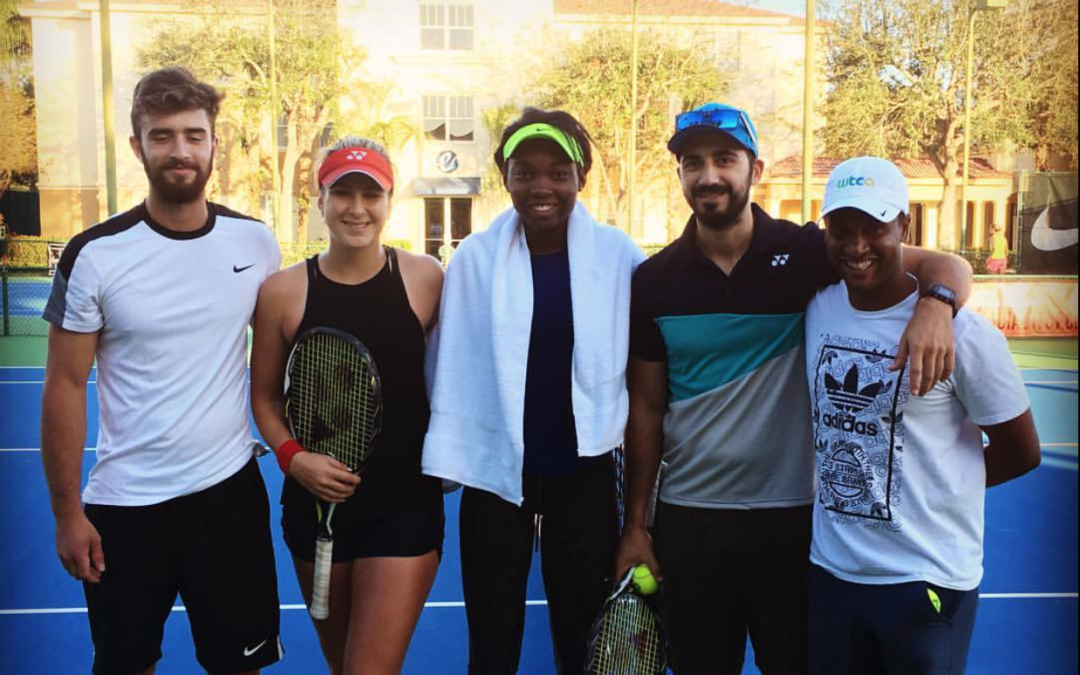Anticipate. In the eyes of venerated tennis coach Freddie Rodriguez, it’s the most important word in a tennis player’s vocabulary. Anticipation is also the reason Rodriguez began playing tennis in the first place and can largely be attributed to why he is still on the court coaching today.
Rodriguez first became involved in the sport at eight years old. He recalls passing the tennis courts daily and constantly wondering how the players were able to anticipate their competition’s next move. Years later, he is still fascinated by the uncanny ability to anticipate the next move in not only tennis, but also in life.
This fascination with anticipation led Rodriguez to begin a career in coaching, which he believes first began at just 14 years old. After becoming the best player in the Dominican Republic and winning a 14 and under Caribbean tournament, his parents sent him to the Nick Bollettieri Academy, where he quickly realized that he was far behind many other athletes his age in terms of training experience.
From this point on, Rodriguez set a goal to earn a scholarship to play collegiate tennis in the United States and to play in the Davis Cup for the Dominican Republic, two goals that he was eventually able to accomplish.
However, the ultimate goal for Rodriguez was to visit the sites of the tournaments he had dreamt of attending as a young boy – Wimbledon, the US Open, Roland-Garros and the Australian Open. In order to achieve this goal, Rodriguez embarked on what would blossom into a highly successful coaching career.
After holding numerous prestigious roles and spending time as a private coach throughout an illustrious career, Rodriguez opted to open the Freddie Rodriguez Tennis School. “I wanted to give access to all this experience to kids that perhaps would never have it if they would not be around me. I wanted to provide this service to my community and my two kids as well,” said Rodriguez.
At the Freddie Rodriguez Tennis School, the coaching philosophy is based on teaching and developing the fundamental skills that enable players to attain their most complete game. The coaches emphasize continuous learning and development of a player’s game.
“The most important thing is to anticipate,” said Rodriguez. “To read where is the ball going to bounce and takes the steps necessary to position myself in the best place possible and then make a choice of which shot I will hit that will create an advantage for me.”
“Tennis is a sport of hitting and receiving, and if you just learn to hit and not to receive you will not win too much. My philosophy is to make the kids autonomous. They learn to play the game by themselves. You teach them how to hit the ball and then create situations where they have to fumigate it out,” he explained.
Another fundamental belief held by Rodriguez is the importance of winning tournaments. “I get athletes to buy into the culture by winning. I believe until a player wins with you, it is hard to be considered their coach. So, I teach them how to win and then they really listen,” he said. “I don’t believe in going to tournaments to improve. I believe in winning. I like to win.”
Rodriguez’s competitive nature is what has allowed him to generate success with his athletes on the court. He firmly believes that in order to achieve within the sport, tennis players must train similarly to the greats.
“The intensity and the volume will vary but not the training,” said Rodriguez. “A six year old kid that is behind the baseline in trouble needs to play middle or crosscourt, so do Serena and Federer. The pace will be different, but the intention is the same.”
These training philosophies have developed over years of experience attending every Grand Slam junior and senior tournament as a coach, serving as Junior Fed Cup Captain for the United States, working for Tennis Canada and doing an immense amount of homework. In order to run a fruitful tennis school, Rodriguez urges other coaches to also garner a wealth of experience.
Additionally, Rodriguez believes that success comes from working alongside a group of committed coaches who are passionate about their job. “Passionate coaches generate business through their excellent service. If not, you will find yourself working double to bring clients to coaches that only focus on a paycheck. People feel that,” he said.
Above all, Rodriguez has found a true sense of purpose in building the Freddie Rodriguez Tennis School. “My goal is not to make money, and of course money will come if I do it properly. My goal is to offer my community guidance at an affordable price to reach their potential,” he explained.

